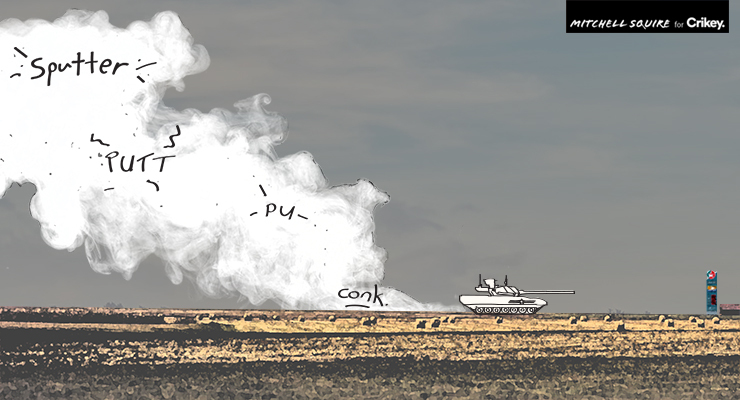
With Russia’s invasion of Ukraine keeping oil prices above $90 a barrel, up nearly 10% in the past month and 20% over the past three months, petrol prices will continue to be a big factor in inflation in Australia — and continue to force real wages down for households.
It also means continuing strong revenue for the regime of Russian President Vladimir Putin, despite international sanctions. In 2021 Russian oil and gas revenue exceeded forecasts by 50%, reaching US$120 billion. It’s also a key part of the revenue of some of the world’s other human rights abusers and mass murderers — the Iranian government and the Saudi regime.
As the Australian Bureau of Statistics noted last year, “automotive fuel is one of the most volatile series measured in the CPI”. It traditionally accounts for between 2% and 5% of the Consumer Price Index. Inflation induced by higher oil prices puts pressure on central banks to tighten monetary policy — despite the fact that oil prices, particularly when they rise due to geopolitical tensions, aren’t responsive to higher interest rates except by the extent to which they smother the economy, cut growth and stifle activity and employment.
Two big changes are reducing our dependence on this volatile energy source. One is very recent — the spread of remote working in the pandemic dramatically reduced commuting for those who could do it, although the rapid growth in online commerce during lockdowns requiring an expansion of freight networks would have partly offset it.
Governments, of course, are now pushing back against home working in response to pressure from powerful lobby groups — commercial property owners who fear falling demand for office space, often funded by major investors, and urban retailers who want office workers to return to redirect spending from home and the suburbs back to city hospitality venues.
The other is the growth of electric vehicles (EVs) where Australia is a global laggard. EV penetration is still well under 1%, compared with more than 40% in Norway and Iceland, more than 20% in Sweden and Hong Kong and more than 5% in many other countries. A key reason is the Coalition’s hostility to EVs — a hostility invented on the run by Scott Morrison in the 2019 election and which we’re stuck with, however many lies the prime minister tells about how he never ridiculed them.
As is now routine in Australian policymaking, it’s been left to the states to drive EV uptake, with the NSW government embracing rebates to encourage sales and investing in charging technology — on the understanding that transforming the car fleet is a crucial part of reaching net zero emissions.
If Morrison wanted to remove a key source of inflation, as well as cut the funding of some of the world’s worst regimes over the long term, he could follow the NSW lead and get serious about driving uptake of EVs — if not to Norwegian levels, then maybe to Swedish ones. In the meantime, we’re funding our enemies and human rights abusers every time we fill up.








You left out one other important benefit that a move to EVs would bring: the security angle. Australia has … what is it? Ninety days of fuel reserves on shore? Something like that. Our supplies are brought here by sea. Want to bring Australia to its knees within a few months? Mount a naval blockade that prevents oil supply: something that either Putin or China could do with impunity.
It beggars belief that a party that is currently trying to mount an election campaign based on the claim that they are the only ones serious about national security, and that is willing to spend $50 billion on just a few submarines without a quibble, is prepared to expose the country to this overwhelming security risk. Incompetent bastards, the lot of them.
Not to mention how satisfying it would be if we could all run our cars based on power we collect from our own rooftops, rather than being slugged close to $2 per litre at the petrol pump.
However, if we’re going to make the move, best do it now. Seems we aren’t capable of manufacturing vehicles here by ourselves anymore. They have to be imported … by sea.
Your words are pure gold, Graeski! If only they could be written on Giant Billboards lit up in neon lights and installed the length and breadth of the country until this federal non-guv-un-meant is no more…
Agreed. I’m pleased to own an EV and to deny despots, dictators and climate denialists my money. Energy security, if anyone is serious about it and future focused, is squarely in the realms of sustainable energy generation that requires no exposed supply chains, and no reliance on unreliable providers. Sun, wind, hydro and hydrogen present a unique opportunity for countries with those four capabilities to delink from the pockets of those I mention above. I now view my EV as a middle-finger salute to the nasty kleptocrat in the Kremlin.
Oh dear, now that will affect the US more than everyone else. Big oil will be mortified. Positive, is now less excuses to harass Iran, Syria, Libya, Iraq, Venezuela and other oil producing countries who don’t kowtow to US BIG OIL. Now time for the US to start “liberating” cobalt and lithium producing countries from evil dictators.
As long as you don’t run against him in an election,Jean-Luc.
That was meant for Tea Earl Gray Hot.
“Make it so!”
Scomo
Manufacture electric cars and trucks in Aus in partnership with a multinational. Aus Gov 51%
Build utility corridors with HS Rail, Freight Rail, Highways, water and Solar panels, National Electricity Grid, ALL along route.
Enough electricity to pump water, drive rail, drive trucks and vehicles. Use hydro, wind, geothermal, wave, where available to supplement and feed into grid.
Who needs foreign fuel?
A new Snowy Scheme!!!!! to build Australia as a nation.